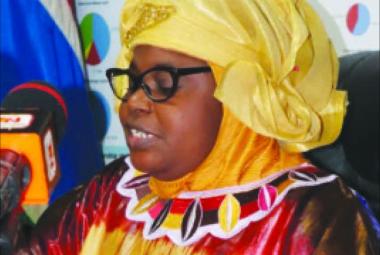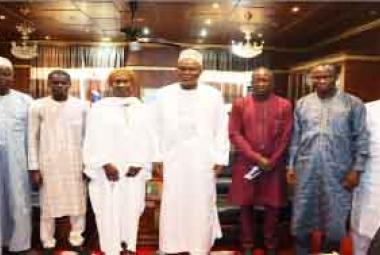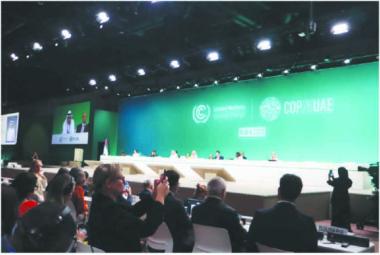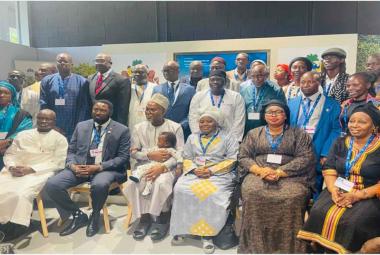The government of The Gambia through theMinistry of Environment, Climate Change and Natural Resources (MECCNAR) is responsible for environment, climate change and natural resources issues in The Gambia. MECCNAR works with stakeholders such as Ministries, Departments and Agencies (MDAs), civil society organizations (CSOs), and the private sector, as well as international development partners that make important contributions to the overall national effort to protect and manage the environment and natural resources of the country.
The Ministry is tasked with the developmentof policy frameworks and legal instruments to guide the governance and management of natural resources and environmental assets. Recently, the Ministry has developed ambitious plans and strategies for net-zero carbon emissions and climate resilience such asThe Gambia Climate Vision by 2050, The Gambia`s Long-Term Climate-Neutral Development Strategy (LTS), Updated Nationally Determined Contribution (NDC) amongst others
To achieve the Gambia Climate Vision’s goal, The Gambia`s Long-Term Climate-Neutral Development Strategy (LTS) was developed in 2022. The LTS focuses on the country`s five key greenhouse gas emitting sectors - namely Energy; Agriculture; Waste Management; Transport and Land Use Land Use Change and Forestry (LULUCF). Building upon the ambitious Second Nationally Determined Contribution, the LTS looks at both mitigation and adaptation actions that would require funding, for the country to reach net-zero emissions by 2050, in line with its commitments under the Paris Agreement and Nationally Determined Contribution (NDC).
1.Ban on Timber Exports
With the endorsement of Cabinet chaired by His Excellency President Adama Barrow in July 2022, the Ministry of Environment, Climate Change and Natural Resources (MECCNAR) under Section 113 of the Forest Act, 2018, banned timber exports and permanently revoked all timber export licenses with immediate effect.
The ban targets timber of the highly prized African Rosewood tree, which is mainly found in West and Central Africa. It has been nearly extinct since 2011.
Following the ban, the government instructed port authorities to refuse the loading of timber logs onto any vessel. In addition, random searches of containers should be heightened.
With the launching of “Operation No Illegal Logging”, The Gambia Police Force would confiscate any illicit timber found in The Gambia, which shall be immediately forfeited to the State.
To fully implement the banon the timber trade, the MECCNAR regards it as essential for all stakeholders to comply with all applicable laws, Regulations, International Treaties, Conventions, and Agreements that are ratified by The Gambia.
As a preventive measure against illegal harvesting, The Gambia Government, through the Environment Ministry would carry out due diligence on timber imported into the country to certify the chain of custody and legal entry into the country.
2.Preliminary Forest Management Certificate Handed to 16 Communities
The Ministry of Environment, Climate Change and Natural Resources through the Department of Forestry in partnership with the Large-scale Ecosystem-based Adaptation Projecthas officially handed preliminary certificates to 16 communities in North Bank Region and Central River Region respectively.
Community forest management is an initiative to promote climate change mitigation as well as protect the forests in the country.
It is one of the most effective and inclusive ways to protect, manage, preserve, and restore forests. It strengthens the collective rights of local communities, prevents deforestation and forest degradation, contributes to climate stability, fosters community, and protects the common goal, contributing to social, economic, and gender justice.
Speaking at the handing over ceremony in Kerewan, NBR, The Honourable Minister at the Ministry of Environment, Climate Change and Natural Resources,Rohey John-Manjang said that the impacts of climate change cannot be efficiently managed without building on forest covers.
She hailed the communities for taking up the bold step to manage their environment, especially the forest as it is one of the best solutions to the adverse effects of climate change. ‘‘I want to thank these communities for taking up this difficult task to manage their forest,’’ she said.
3.Launching of the West Africa Coastal Resilience Investment Project
The Ministry of Environment, Climate Change and Natural Resources in collaboration with the World Bank recently launched the West Africa Coastal Areas (WACA) Resilience Investment Project 2.
WACA is a five-year project that is part of the World Bank regional programme which seeks to provide financial and technical assistance to countries and regional institutions to address coastal resilience, using coastal erosion, flooding, and pollution as entry points.
In The Gambia, the project will intervene in the “Kotu Stream” area, where it will build physical coastal infrastructure and nature-based solutions to protect communities and livelihoods from coastal erosion and flooding.
In his launching statement, Vice President Mohammed B.S. Jallow explained that the project will support the Government to improve the institutional and policy frameworks around disaster risk management, integrated coastal development, natural resources management, and urban resilience,” VP Jallow stated.
“The management of the coastal ecosystem will be supported through the restoration of degraded ecosystems, as well as investments to reduce pressure on the most fragile, through strengthening protected areas, as well as providing alternatives to livelihoods depending on fragile ecosystems,” he further stated.
Hon. Rohey John-Manjang, Minister of Environment Climate Change and Natural Resources, noted that the objective of the WACA project is in line with the new green recovery-focused NDP.
“Following various consultations with key stakeholders, the rehabilitation of the Kotu Stream was identified as a priority intervention site, with the following envisaged objectives that would reduce the vulnerability of the Kotu Stream`s inhabitants, to the effects of climate change: strengthening the resilience to flood risks and improving biodiversity,’’ she stated.
The representative of the World Bank Country Office, SeynabouThiawSeye remarked that by safeguarding the productivity of the coastal landscape and addressing risks from natural hazards, The Gambia will be in a better position to take full advantage of its many assets and better prepare to manage the effects of climate change.
4.Validation of the Report on Energy-Efficient Improved Cook Stoves
The Ministry of Environment, Climate Change and Natural Resources (MEECNAR) through the Environment and Resilience Development Project (ERDP) in collaboration with UNDP validated the draft report of the large-scale impact assessment of the energy-efficient improved cooking stoves. The study was facilitated by TANGO.
The study was conducted to assess the impact of the use of energy-efficient cookstoves on the social, economic, environmental,and health of project beneficiaries within three selected project intervention areas: namely Kanifing Municipality (Serrekunda and Bakau), North Bank Region (Essau) and West Coast Region (Sohm).
The study revealed that the energy-efficient improved cook stove is considered more environmentally friendly compared to the traditional stoves as most of the respondents in this study were able to save at least one or two bags of charcoal per month by using the improved cook stove depending on the family type, household size and a number of meals prepared per day.
It also revealed that the use of improved cookstoves was more economical, healthier, faster, user-friendly, and safer than traditional cooking stoves. The improved cook stove can save money and time for each household, help to reduce environmental problems, and promote social and health benefits, especially for women and children.
5.Visit to Environmentally concerned areas
The Hon. Minister of Environment, Climate Change and Natural Resources, Hon. Rohey John-Manjang together with Hon. Ministers of Lands, Works, and other relevant stakeholders, embarked on a 2-day site visit to environmentally concerned areas within the GBA.
The objective of the site visit is to better understand the environmental challenges arising from the activities at the identified sites and to effectively engage with the relevant institutions to propose and implement sustainable measures to manage or prevent these challenges.
“We are here today to build on our past experiences to come up with sustainable outcomes to prevent future environmental disasters.” Hon. Minister, Mrs. Rohey John-Manjang.






